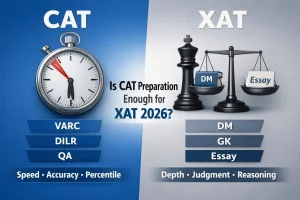In recent years, PGDM in rural management has become more popular in India. Students can study public health, education, rural marketing, business sustainability, precision farming, and many other topics with a PGDM in rural management. Students specialise in a range of fields according to their areas of expertise, even though the PGDM program helps them to overcome the difficulties of a rural setting. Selecting the appropriate institution to undertake the PGDM program in rural management is crucial.
The scope of rural management is broad, both in India and internationally. Careers in marketing, finance, purchasing, human resource development, project implementation, and various rural-based enterprise segments are available to students with a postgraduate degree in rural management. In India’s rural management sector, there are several areas that require new solutions. Important aspects include social infrastructure, agricultural expansion, community planning, and public health.
Students can learn how to properly manage rural resources by studying rural management. Through the conception and implementation of pertinent initiatives, a PGDM program gives students the opportunity to pursue employment in a variety of rural development fields. A significant portion of India’s people make their living from farming. It is only right that the country’s young people focus their educational efforts on improving rural areas. Since the government started hiring managers (rural) to help with the expansion, development, and improvement projects of the rural areas, it has started to show promise in recent years.
A Brief Overview of Postgraduate Diploma in Rural Management (PGDRM)
The fact that over 60% of Indians live in rural areas makes it imperative to lead development in these areas since they are unable to utilise metropolitan amenities. This makes learning in this course quite difficult as well.
The Postgraduate Diploma in Rural Management Course is appropriate for students who are interested in the development and management of rural areas. Research on the features of rural societies is also included in this course. Local, national, and worldwide cooperatives, development organisations, non-governmental organisations, and funding agencies are looking for PGDRM graduates.
The course lasts for two years at full-time. This course is open to applicants who have earned a bachelor’s degree in any field with a cumulative grade point average of at least 50%. The training is divided into four parts: the development internship, the management internship, the village fieldwork, and the classroom.
Reasons to Pursue a Postgraduate Diploma in Rural Management (PGDRM)
There are a ton of job opportunities in the field of rural management in India because there are so many rural management regions in the country. A person with a PGDM in rural management may seek a position as a village development officer (VDO) in the government sector or work for or manage an NGO. Other job sectors include management of agricultural products, agribusiness firms, agricultural marketing, and the rural cooperative sector.
Companies that employ rural managers include Mahindra, Hero Group, NABARD, ICICI Bank, Aditya Birla Group, Shriram Group, Amul, Monsanto, Tata Teleservices, and national and international non-governmental organisations. A person with a PGDM in rural management can work as a trainer, researcher, consultant, rural minister, senior program officer, research officer, or rural executive. 2. The starting salary in this field is 3 lacs, and it progressively rises according to experience. The wage scale for government employees, however, is determined by the government itself.
In addition to offering rural managers a wide range of opportunities and a respectable compensation, this program enables them to work in a very rewarding setting where they may get up close and personal with nature.
Career and Job Opportunities After PGDM in Rural Management
A PGDM in rural management opens doors to a wide spectrum of career opportunities across both public and private sectors. Graduates are equipped to tackle challenges in rural development, making them valuable assets in roles such as Village Development Officer (VDO), Rural Executive, Program Officer, and Consultant. The PGDM program in rural management trains students to work in areas like agricultural marketing, agribusiness firms, rural cooperatives, and NGOs. With India’s rural population comprising over 60% of the total, the PGDM scope in rural management is vast and growing.
Top recruiters include NABARD, Amul, ICICI Bank, Mahindra, Tata Teleservices, and international development agencies. These organizations seek professionals who can lead sustainable initiatives in public health, education, infrastructure, and community planning. Graduates also find roles in research, training, and policy-making, contributing to long-term rural transformation.
For aspirants looking to specialize, PGDM courses in Mumbai offer exposure to urban-rural dynamics and access to leading PGDM colleges with strong industry linkages. Whether working in grassroots development or strategic planning, rural managers play a pivotal role in shaping inclusive growth. This career path not only promises professional success but also a deep sense of purpose and societal impact.
Salary Prospects for Graduates of the Postgraduate Diploma in Rural Management
Graduates of the Postgraduate Diploma in Rural Management (PGDRM) can expect promising salary prospects, especially as demand for skilled rural managers continues to rise. Entry-level salaries typically start around ₹3 lakhs per annum, with steady growth based on experience, sector, and role. Those working with reputed NGOs, development agencies, or corporate CSR divisions often receive competitive packages, while government roles follow structured pay scales.
The PGDM scope in rural management includes positions in agribusiness, rural finance, project implementation, and social infrastructure—each offering varied compensation. Professionals in consulting, research, and senior program management can earn upwards of ₹6–10 lakhs annually, especially with international exposure or specialized expertise.
Graduates from top PGDM colleges often benefit from better placement opportunities and higher starting salaries. Institutions offering PGDM courses in Mumbai are particularly known for their industry connections and urban-rural interface, enhancing employability. The PGDM in rural management not only provides financial stability but also the chance to work in meaningful, nature-connected environments.
As rural development becomes central to India’s growth strategy, the PGDM program in rural management ensures that graduates are well-positioned to lead change—earning not just a paycheck, but also respect and fulfillment in their careers.
Future Scope and Growth After Completing PGDM in Rural Management
PGDRM fulfils a personal obligation to society in addition to promising a prosperous future. One of the main responsibilities of rural development managers is to improve the rural sector through sustainable development methods and administration. In the last five years, both the field’s scope and student engagement have significantly increased.
The fundamentals of rural product marketing, infrastructure, social sector services, economics, development communication, skill development, good governance, livelihoods, agro-processing, project planning, and management are all included in the course’s curriculum and projects.
Proficient speaking abilities and outstanding leadership qualities are essential. In order to manage rural circumstances, the course applies social and economic ideas.
According to an Accenture poll, 50% of India’s GDP comes from the rural economy. This interprets the sector’s enormous contribution as well as the expanded breadth and job prospects. The training thoroughly prepares candidates for the informal sector’s high demand for qualified, business-minded managers.
For students who are capable of handling the strain and are interested in working in the rural sector, the Postgraduate Diploma in Rural Management (PGDRM) is the ideal program.
Also Read – Importance of Rural Management Education in India






